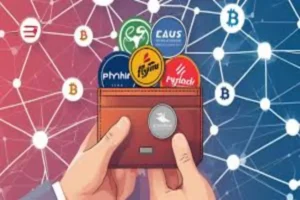How Governance Tokens Promote Active User Engagement

Introduction
Governance tokens represent a revolutionary shift in how decisions are made within decentralized systems. These digital assets are not just a form of currency but are integral to the management and evolution of decentralized systems. They empower users to participate in decision-making processes, thereby fostering a more engaged and active community. Understanding their role helps to grasp their influence on user engagement and the broader ecosystem. For those looking to enhance their knowledge and involvement in such systems, resources like the-wealthcatalystai.com offer valuable insights into maximizing engagement and understanding the mechanics of governance tokens.
How Governance Tokens Work

Mechanics of Governance Tokens
Governance tokens operate as a crucial element in decentralized governance structures, allowing token holders to vote on key decisions related to the system’s development and policy changes. These tokens are typically built on blockchain technology, providing transparency and security in the voting process. The tokens give holders voting power proportional to their stake, enabling them to propose changes, vote on proposals, and influence the direction of the project.
Voting Mechanisms and Decision-Making
Token-based voting mechanisms are varied, ranging from simple majority votes to more complex quadratic voting systems. On-chain governance, where decisions are recorded and executed directly on the blockchain, contrasts with off-chain governance, which involves off-chain discussions and voting. For example, Compound’s governance system uses a proposal and voting process where token holders can propose changes and vote to approve or reject them. This model has proven effective in aligning incentives and ensuring that decisions reflect the interests of the broader community.
Incentivizing Participation Through Governance Tokens
Economic Incentives for Active Engagement
Governance tokens often come with economic incentives designed to encourage active participation. Token holders may receive rewards for their involvement, such as additional tokens or staking rewards. This economic model aligns participants’ financial interests with the health and growth of the system. For instance, staking rewards provide users with a financial return on their tokens, incentivizing them to hold and engage with the system actively.
Non-Economic Incentives and Community Building
In addition to financial rewards, non-economic incentives play a crucial role in promoting engagement. Governance tokens can grant users a sense of recognition and influence within the community. Active participants may gain status or leadership roles, contributing to a stronger sense of belonging and ownership. This influence extends to shaping the project’s direction, fostering a deeper connection and commitment to the system’s success.
Challenges and Limitations
Potential Drawbacks of Governance Tokens
Despite their benefits, governance tokens face several challenges. Voter apathy is a significant issue, with many token holders failing to participate in governance activities. This can lead to a small, active subset of the community having disproportionate influence. Additionally, governance attacks, where malicious actors manipulate voting outcomes, pose security risks that need to be addressed through robust safeguards and mechanisms.
Balancing Power and Avoiding Centralization
Centralization of voting power is another concern. Large stakeholders or whales can dominate decision-making processes, potentially sidelining smaller participants. Effective governance structures must balance power to ensure inclusivity and fairness. Strategies such as quadratic voting, where the cost of additional votes increases, can help mitigate these risks and promote a more equitable governance model.
Future Trends in Governance Tokens
Innovations in Governance Token Models
The landscape of governance tokens is continually evolving, with innovations aimed at improving participation and decision-making processes. Emerging models include hybrid governance systems that combine on-chain and off-chain elements, and improved voting mechanisms that address current limitations. These innovations aim to enhance user engagement and streamline governance processes, paving the way for more dynamic and adaptable systems.
The Role of Governance Tokens in Web3 and Beyond
Governance tokens are central to the Web3 vision of a decentralized internet. They facilitate user-driven governance and ownership in a variety of digital systems, from social networks to financial applications. As the Web3 ecosystem grows, governance tokens will play a pivotal role in shaping how decentralized applications are managed and evolved, influencing both the technology and the broader adoption of decentralized systems.
Conclusion
Governance tokens represent a significant advancement in decentralized management, promoting active user engagement through both economic and non-economic incentives. They enable token holders to influence decisions, contribute to community building, and drive the evolution of decentralized projects. Despite challenges such as voter apathy and centralization risks, governance tokens offer a promising approach to fostering a more engaged and participatory ecosystem. As innovations continue to emerge, governance tokens will remain a key component in the development of decentralized systems and the Web3 revolution.







